2.获取事实性的具体信息
开始访谈前要做的准备

开始访谈前要做的准备一、明确访谈目的1. 确定核心问题- 访谈目的是整个访谈的方向指引。
例如,如果是进行学术研究访谈,要清楚是为了验证某个理论假设,还是探索新的研究领域。
如果是新闻访谈,是要挖掘事件背后的真相,还是获取人物的独特观点等。
- 对于企业内部的员工访谈,可能是为了了解工作中的问题、员工满意度或者收集改进工作流程的建议等。
2. 细化目标- 将大的访谈目的分解成具体的、可操作的小目标。
在市场调研访谈中,大目的是了解消费者对新产品的看法,小目标可以是消费者对产品功能、外观、价格等方面的具体评价。
二、了解访谈对象1. 基本信息- 包括访谈对象的姓名、年龄、性别、职业等。
如果是公众人物,要对其公众形象、主要成就等有所了解。
例如访谈一位作家,要知道他的代表作品、写作风格等。
- 对于企业访谈对象,要清楚其在企业中的职位、职责范围等,这有助于确定访谈的重点内容。
2. 背景知识- 了解访谈对象的文化背景、社会背景等。
不同文化背景的人可能有不同的思维方式和沟通习惯。
在跨文化访谈中,与西方人和东方人访谈可能会有不同的交流方式和敏感话题。
- 了解访谈对象所在行业或领域的相关知识。
如果访谈一位科技公司的工程师,要对相关的科技知识、行业发展趋势有一定的了解,这样才能更好地与访谈对象交流,提出有深度的问题。
三、设计访谈提纲1. 问题类型- 开放性问题:例如“您对当前的教育改革有什么看法?”这类问题可以让访谈对象自由发挥,提供更丰富的信息。
- 封闭性问题:像“您是否支持这项政策?(是/否)”这种问题答案比较固定,主要用于获取明确的态度或者事实性信息。
- 半开放性问题:“您认为在这个项目中,最困难的部分是什么?是资金、技术还是人员方面?”这种问题既有一定的引导性,又给访谈对象一定的发挥空间。
2. 问题顺序- 一般从简单、轻松的问题开始,逐渐过渡到复杂、深入的问题。
先问“您在这个公司工作多久了?”然后再问“您对公司目前的发展战略有什么看法?”- 按照逻辑顺序排列问题。
心理咨询的技术

影响与干预的技术
(一)即刻化 1、概念又称为即时性、即刻化。有两层含义,第一个含义是,咨询者 帮助来访者注意“此时此地”的状态而不要过分的注意过去和未来。第 二个含义是,指来访者涉及咨询关系时,咨询者要对此敏感,对来访者 指向自身的言语、行为、情感予以必要的反应。 2、注意 (1)咨询者要即时描述出他所看到的正在发生的事情,不要等到会谈 结束时才来进行描述。 (2)反应“此时此刻”的体验,即时性语句应该用现在时态。 (3)当谈到自己的感受时,要表示出“我”这个主体 (4)要把握好表达及时化反应的时机
解释与整合信息技术
(一)鼓励技术 1、概念: 鼓励,即直接地重复求助者的话或仅以某些词语如“嗯”“讲下去”等 ,来强化求助者叙述的内容并鼓励其进一步讲下去。 2、作用 (1)鼓励技术可以促进会谈,促进来访者的表达与探索 (2)通过对求助者所述内容的某一点、某一方面做选择性关注,引导求 助者向着某一方面作进一步深入的探索。
结束语
用平静的心去接受无法改变的,用勇敢的心改变能够改变的,用智慧的心去辨别它们。
解释与整合信息技术
(四)内容反应 1、概念 内容反应又称说明或释义。是指咨询者对来访者的信息内容解释后,再反馈给来访者本人 。换句话说,就是将来访者回答的内容经过概括、综合与整理,用自己的话反馈给求助者 ,以达到加强理解、促进沟通的目的。 2、作用 (1)加强理解,促进沟通。 (2)使求助者有机会再次剖析自己的困扰,重新组合那些零散的事件和关系,深化会谈内 容 (3)帮助求助者更清楚地做出决定。 3、步骤 (1)咨询者会议来访者的信息——他告诉了我些什么? (2)咨询者问自己“在他的信息中存在什么样的情景、人物、物体、思想? (3)咨询者最好选用来访者言语中最具代表性、敏感性、最重要的词语。 (4)将来访者的主要信息用自己的语言表达出来。 (5)通过倾听和观察来访者的反应来评价自己进行释义的效果。
《学前教育科研方法》试卷附参考答案
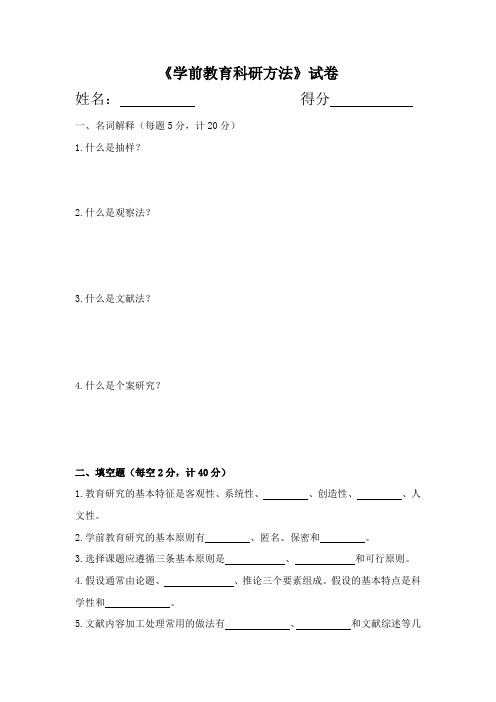
《学前教育科研方法》试卷姓名:得分一、名词解释(每题5分,计20分)1.什么是抽样?2.什么是观察法?3.什么是文献法?4.什么是个案研究?二、填空题(每空2分,计40分)1.教育研究的基本特征是客观性、系统性、、创造性、、人文性。
2.学前教育研究的基本原则有、匿名、保密和。
3.选择课题应遵循三条基本原则是、和可行原则。
4.假设通常由论题、、推论三个要素组成。
假设的基本特点是科学性和。
5.文献内容加工处理常用的做法有、和文献综述等几种形式。
6.临床法是为研究儿童认知能力而独创的一种研究方法。
它将观察、访谈、测验、实验等方法有机地糅合在一起,换句话说,临床法是对观察法的一种改进。
7.根据研究课题的性质,调查研究可分为:现状调查、相关调查、、跟踪调查。
8.实验效度是指实验的和真实程度。
9.内容分析法是一种以为研究对象,进行定量描述的研究方法。
10.课题研究中,测量包括物理测量、教育测量、和。
11.信度是指测验结果的可靠性和,即同一个测验对同一组被试先后实施两次,所得测量的程度。
12.社会测量法是美国的莫雷诺于20世纪30年代提出的研究人际关系状况的一种研究方法。
13.统计分析方法的特征主要有科学性、和可重复性。
三、问答题(共4题,计40分)1.教育研究的基本任务是什么?(8分)2. 学前教育观察实施的步骤?(10分)3.简述问卷设计的准则。
(10分)4.谈谈你对行为矫正法的认识。
(12分)附参考答案:一、名词解释(每题5分,计20分)1.什么是抽样?答:抽样就是从一个总体中抽取部分具有代表性的个体作为样本,然后用这一样本图推断总体。
2.什么是观察法?答:观察法指通过感官或辅助仪器,有目的、有计划地对自然状态下发生的现象或行为进行系统、连续的考察、记录、分析,从而获取事实材料的研究方法。
科学研究始于观察,观察是研究的基础。
3.什么是文献法?答:文献法指通过查阅、整理、分析已有的文献资料,了解教育事实,探索教育现象的研究方法。
MBTI职业性格测试的16种性格分析

MBTI职业性格测试相关资料4 个维度上偏好的组合就构成一种特定的性格,共有16 种不同的类型:ISTJ 《检查员型》ISFJ 《照顾者型》INFJ《博爱型、作家型》INTJ《专家型》ISTP《冒险家型》ISFP《艺术家型》INFP《哲学家型》INTP《学者型》ESTP《挑战者型》ESFP《表演者型》ENFP《记者型》ENTP《发明家型》ESTJ《大男人型》ESFJ《主人型》ENFJ《教育家型》ENTJ《元帅型》1.ISTJ《检查员型》:详尽、精确、系统、勤劳,关注细节。
致力于改善组织程序与过程,无论组织处在发展的顺境还是逆境,都对组织保持忠诚。
( 1)领导模式:以事实和经验做决定建立可靠、稳定、持续的工作绩效尊重传统和等级制度奖励遵循规则完成任务的员工关注组织的即时性和实际性需要倾向性顺序:①感觉②思维③情感④直觉(2)解决问题模式:喜欢完全依据事实在逻辑框架里进行分析,为获得理想结果,需考虑对人们的影响,然后寻找更多的可能性和其它含义。
工作环境倾向性:①喜欢与现实、工作努力、关注事实和结果的人共事②能长期提供安全性的环境③ 奖励稳步发展和按期完成任务的环境④使用系统性工作方法的环境⑤任务型定向和鼓励坚定意志的环境⑥提供安静、整齐设施的环境⑦环境中允许有不被打扰工作的个人空间潜在的缺点:①因受惠于日常工作而忽视具有长远意义的目标②可能忽视人际交往的细节③工作方法刻板、不灵活,对变革较少开放态度④期望他人和自己一样,同样注意细节和服从管理程序发展建议:①除了关注现实问题,需关注更深远的、定向于未来的问题②需考虑人的因素,向他人表达其应得的赞赏③为避免陈规,尝试寻找新的选择④需培养耐心,应付那些需要用不同方式沟通或忽视规则和程序的人适合领域:工商业领域、政府机构金融银行业、政府机构技术领域医务领域适合职业:审计师、会计、财务经理、办公室行政管理、后勤和供应管理、中层经理、公务(法律、税务)执行人员等银行信贷员、成本估价师、保险精算师、税务经纪人、税务检查员等;机械、电气工程师、计算机程序员、数据库管理员、地质、气象学家、法律研究者、律师等;外科医生、药剂师、实验室技术人员、牙科医生、医学研究员等2. ISTP《冒险家型》:注重实用性,尊重事实,寻求有利方法,具有现实性,只信服被论证的结果。
最新中考英语命题比赛双向细目表
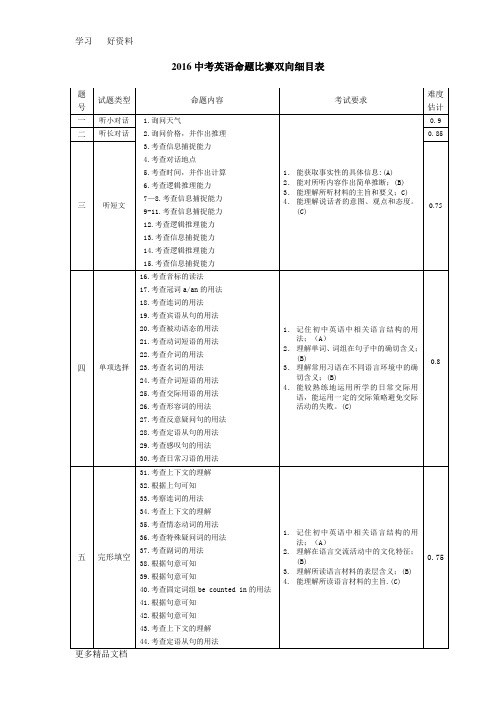
2016中考英语命题比赛双向细目表2012年中考模拟试卷英语卷考生须知:1、本试卷满分120分,考试时间100分钟2、答题前,在答题纸上写姓名和准考证号。
3、必须在答题纸的对应答题位置上答题,写在其他地方无效。
1至60小题在答题纸上涂黑作答,答题方式详见答题纸上的说明。
4、做听力题时,先将答案画在试卷上。
录音内容结束后你将有1分钟的时间将试卷上的答案转涂到答题纸上。
5、考试结束后,试题卷和答题纸一并上交。
Ⅰ. 听力部分 (25分)一、听短对话,回答问题(共5小题,计5分)听下面5段对话。
每段对话后面有一个小题,从题中所给的A、B、C三个选项中选出最佳选项,并标在试卷的相应位置。
听完每段对话后,你都有10秒钟的时间来回答有关小题和阅读下一小题。
每段对话仅读一遍。
1. What’s the weather like now?(原创)A. SunnyB. CloudyC. Rainy2. How does the woman think of this T-shirt? (原创)A. CheapB. ExpensiveC. Great3. Why was Julia late? (原创)A. Because of the heavy traffic.B. Because she had no car.C. Because her car was broken.4. Where does the conversation most likely take place? (改编)A. In the hotel.B. In the restaurant.C. In the theatre.5. Before what time should the man be at the train station? (原创)A.2:20 pm.B. 1:50 pm.C. 2:50 pm.二、听较长对话,回答问题(共6小题,计12分)听下面两段长对话。
吉林省长春市普通高中2019届高三质量监测(二)英语试卷+含答案

长春市普通高中2018届高三质量监测(二)英语参考答案及评分参考说明:本试题满分150分。
其中听力30分,笔试120分。
第I卷第一部分听力(共两节,共20小题;每小题1.5分,满分30分)听力原文:(Text 1)W: Hi, Ted, our meeting will start in 30 minutes. I need to copy your report, canI get it now?M: I am working on the last sentence, just give me 10 more minutes.(Text 2)W: Dad, how about we give mom a surprise birthday party this year?M: That is a great idea. I’ll be in charge of inviting people and you can call your brother to prepare the party together.(Text 3)W: How is everything going? Do you like your new boss?M: At the beginning, I thought it would be tough, since everybody said he is very strict. But after working with him, I think he is a smart guy.(Text 4)W: We just need a cowboy shirt for our son’s school show, why did you also buy a hat?M: The shirt is only $25, and the website said you will get free delivery if you purchase more than $40, so I added the hat to make it exactly $40.(Text 5)W: I lost my passport, sir. I’ll travel to Greece tomor row. What should I do? M: I’m sorry to hear that. But you should go to the embassy instead of police station. (Text 6)W: Where are you, Darryl? Is it sunny there as it is here today?M: No, it is pretty wet. I’m going to meet my doctor.W: Are you not working today?M: No, not today. I work every day except Tuesday and Friday.W: What do you do?M: I work at a golf course. I’m a groundsman.W: OK. So what does a groundsman do?M: We look after the golf course—make sure the grass is OK and all of that. It’s like being a gardener.(Text 7)W: Hello, customer service. How may I help you today?M: Hello. I noticed something strange on my account.W: Let me take a look. Your account history shows purchases nearly every day beginning two weeks ago.M: That’s the problem. I haven’t made any purchases.W: Do you have a shared account, by any chance?M: Yes, that’s shared by my entire family. My wife and both of my children wouldn’t buy things without asking me first.W: Are you sure, sir? In fact, both of your children are both logging on right now. M: Thanks. I got it. They’re at home now and I will have a talk with them. (Text 8)W: John, I’ve decided I’m going to take a year off. I have spoken to the head of the department and I have got permission to stop studying at the end of this semester.M: Where are you going to go? What are you going to do, Cherry?W: I’m going to Australia. I want to travel around Australia. But first I’m going to study English at a language school.M: What a great idea! How long are you going to be there?W: I’m going to be there for a whole year. When I get there, I’m only going to study in a language school for a month. Then I’ll go traveling.M: Are you going to travel for a whole eleven months?W: I don’t know. I might travel for a bit then stop and work for a bit.M: Do you have enough money?W: Money is a problem but I’m going to be able to work. I think I’ll get a working holiday visa and I’m going to be able to work legally.(Text 9)W: I’d like to talk about this watch. It’s quite old, nearly sixty years old. It’s got a leather black band. The face of the watch is white and it’s square—well it isn’t telling the right time.M: Why is this watch special, Helen?W: It was my grandfather’s watch. He came to England more than fift y years ago and this is the watch he was wearing when he arrived here. When he came over here he didn’t have much—just a few pounds in his pocket, you know. But this watch wasa present to him from his grandfather—his twenty first birthday present—so itwa s really special to him and now it’s special to me.M: Is it very valuable? I mean, I know you don’t want to sell it or anything but is it worth a lot of money?W: No, not at all. It doesn’t even tell the right time! It’s just an ordinary watch but it’s sp ecial to me because it really reminds me of my grandfather.M: Is your grandfather still alive?W: No, he isn’t. He died 2 years ago. He left the watch to me in his will. (Text 10)Welcome to Ocean Life. It’s wonderful to see so many people here toda y. Since some of you haven’t been here before, let me tell you something about our sea park. Ocean Life is set in fantastic grounds and we advise you to spend several hours wandering around. There are over forty shows, as well as plenty of other activities for all the family. We feel that it is better that some sea creatures such as whales and sharks aren’t kept in a sea park, because they have better lives in their natural homes. However, although you won’t see these creatures here, you will learn about them in many of our interesting and educational shows. Education is important, but we know that being interested while finding things out is more important, especially for our younger visitors. Our specially trained staff can answer any of your questions about the sea, sea life, pollution and protection. We also encourage school visits,and help teachers by providing information and ideas for use in the classroom. Ocean Life is also known for saving sea creatures. We offer care for injured creatures sent to us and we return them to their natural homes when they are strong enough. We also take part in many projects throughout the world, and it is our aim to make sure that our visitors become aware of the problems and dangers that affect sea life. Ok, thanks for listening to me.【参考答案及解析】1.A 【命题立意】考查考生获取事实性具体信息的能力。
新闻的阅读与分析技巧

新闻的阅读与分析技巧在信息爆炸的时代,新闻已经成为人们获取信息的主要途径之一。
然而,如何准确理解和分析新闻成为了一个重要的课题。
本文将介绍几个新闻的阅读与分析技巧,助您在海量信息中准确获取所需信息。
1. 确定新闻来源的可信度首先,在阅读新闻之前,您要确保新闻来源的可信度。
新闻的可信度直接关系到新闻内容的真实性和客观性。
您可以通过以下几个方面来判断新闻来源的可信度:(1)查看新闻机构的声誉和历史:了解新闻机构的背景和信誉,例如是否有报道经验、是否有专业团队等;(2)关注新闻报道的多元性:如果某个新闻机构只报道特定政治观点或利益集团,那么您可以怀疑其新闻的客观性;(3)查实新闻报道的事实依据:有些新闻机构会在报道中引用独立的调查报告或具体数据,您可以通过查找这些信息来判断新闻的可信度。
2. 分析新闻的标题和导语在快速浏览新闻时,对标题和导语进行分析可以帮助您更好地理解新闻内容。
标题和导语通常都是编辑精心设计的,目的是吸引读者的注意力并传达新闻的要点。
因此,您可以通过以下几个方面来分析新闻标题和导语:(1)关注标题和导语中的关键词:这些关键词往往能够迅速揭示新闻的主题和核心内容;(2)理解标题和导语的措辞:有些标题和导语使用夸张、戏剧性的措辞来吸引读者,您需要深入阅读正文来了解真实情况;(3)对比多家媒体的标题和导语:不同媒体对同一新闻事件的标题和导语可能存在差异,通过对比可以获取更全面的信息。
3. 阅读全文并辨析事实和观点当您决定深入阅读一篇新闻时,需要提高辨析事实和观点的能力。
许多新闻报道会混合事实和作者的观点,您需要通过以下几个方面来分析文章内容:(1)关注事实描述的细节:查看新闻中所提到的具体数据、时间和地点等信息,确保其与现实相符;(2)理解作者的观点和立场:新闻是由人撰写的,作者的态度和观点会在文章中得以表达,您需要判断这些观点对于新闻的影响;(3)扩大信息来源的广度:阅读多个媒体对于同一事件的报道,可以帮助您获取更全面、客观的观点。
新闻采访提纲范例及要领

新闻采访提纲范例及要领
一、采访目的
1.确定新闻事件的事实真相和背后的故事
2.获取关键人物的观点和态度
3.提供详细的背景信息和相关数据
4.引发公众对事件的关注和讨论
二、采访提纲范例
题目:市贫困地区教育扶贫政策的实施情况
一、引入
1.市贫困地区教育扶贫政策的实施情况备受关注
2.准备采访政府相关部门和受益学生和家庭,了解政策的具体内容和影响
二、政府部门观点
2.询问政府在政策实施过程中面临的困难和挑战
3.了解政府在保障政策公平性和监管执行方面的措施
三、受益学生和家庭观点
1.采访几个受益学生和家庭代表,并了解他们的学习和生活改变
2.询问他们对政策的满意度和建议
3.记录具体案例,展示政策对个体和社会的实际影响
四、专家观点
1.采访当地教育专家或学者,了解政策对教育和贫困地区发展的意义
2.请教他们对政策的优缺点和改进建议
五、总结
1.归纳政策实施情况和效果
2.分析政府和个体在实施过程中的困难和挑战
3.提出相关建议,并展望未来政策的发展方向
三、采访要领
1.确定采访目标:明确需要采访的人物和机构,明确采访的目的和角度
2.做好准备:了解采访对象的基本情况,准备好问题的提纲和补充问题
3.保持专业和客观:不带有个人的偏见和情感,对待采访对象要尊重和耐心
4.善于引导和追问:通过提问和追问获取更多的信息和观点,确保采访的全面性和准确性
5.注意记录和整理:及时记录采访对象的回答和观点,并整理成完整的稿件或报道
四、总结。
四川自考02134信息系统设计与分析课后答案第二章信息、管理与信息系统
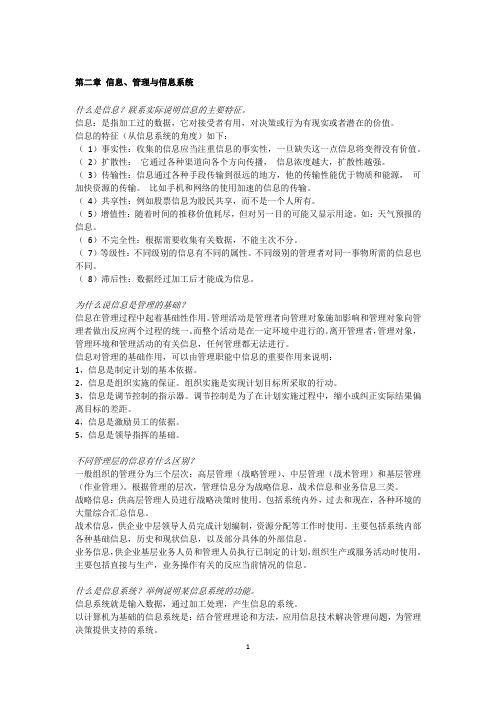
第二章信息、管理与信息系统什么是信息?联系实际说明信息的主要特征。
信息:是指加工过的数据,它对接受者有用,对决策或行为有现实或者潜在的价值。
信息的特征(从信息系统的角度)如下:(1)事实性:收集的信息应当注重信息的事实性,一旦缺失这一点信息将变得没有价值。
(2)扩散性:它通过各种渠道向各个方向传播,信息浓度越大,扩散性越强。
(3)传输性:信息通过各种手段传输到很远的地方,他的传输性能优于物质和能源,可加快资源的传输。
比如手机和网络的使用加速的信息的传输。
(4)共享性:例如股票信息为股民共享,而不是一个人所有。
(5)增值性:随着时间的推移价值耗尽,但对另一目的可能又显示用途。
如:天气预报的信息。
(6)不完全性:根据需要收集有关数据,不能主次不分。
(7)等级性:不同级别的信息有不同的属性。
不同级别的管理者对同一事物所需的信息也不同。
(8)滞后性:数据经过加工后才能成为信息。
为什么说信息是管理的基础?信息在管理过程中起着基础性作用。
管理活动是管理者向管理对象施加影响和管理对象向管理者做出反应两个过程的统一。
而整个活动是在一定环境中进行的。
离开管理者,管理对象,管理环境和管理活动的有关信息,任何管理都无法进行。
信息对管理的基础作用,可以由管理职能中信息的重要作用来说明:1,信息是制定计划的基本依据。
2,信息是组织实施的保证。
组织实施是实现计划目标所采取的行动。
3,信息是调节控制的指示器。
调节控制是为了在计划实施过程中,缩小或纠正实际结果偏离目标的差距。
4,信息是激励员工的依据。
5,信息是领导指挥的基础。
不同管理层的信息有什么区别?一般组织的管理分为三个层次:高层管理(战略管理)、中层管理(战术管理)和基层管理(作业管理)。
根据管理的层次,管理信息分为战略信息,战术信息和业务信息三类。
战略信息:供高层管理人员进行战略决策时使用。
包括系统内外,过去和现在,各种环境的大量综合汇总信息。
战术信息,供企业中层领导人员完成计划编制,资源分配等工作时使用。
部编版八年级上册语文第一课《消息二则》教案及知识点
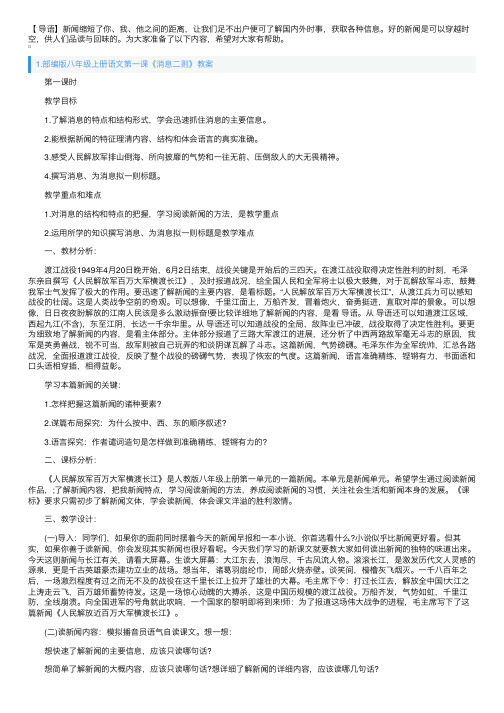
【导语】新闻缩短了你、我、他之间的距离,让我们⾜不出户便可了解国内外时事,获取各种信息。
好的新闻是可以穿越时空,供⼈们品读与回味的。
为⼤家准备了以下内容,希望对⼤家有帮助。
1.部编版⼋年级上册语⽂第⼀课《消息⼆则》教案 第⼀课时 教学⽬标 1.了解消息的特点和结构形式,学会迅速抓住消息的主要信息。
2.能根据新闻的特征理清内容、结构和体会语⾔的真实准确。
3.感受⼈民解放军排⼭倒海、所向披靡的⽓势和⼀往⽆前、压倒敌⼈的⼤⽆畏精神。
4.撰写消息、为消息拟⼀则标题。
教学重点和难点 1.对消息的结构和特点的把握,学习阅读新闻的⽅法,是教学重点 2.运⽤所学的知识撰写消息、为消息拟⼀则标题是教学难点 ⼀、教材分析: 渡江战役1949年4⽉20⽇晚开始,6⽉2⽇结束,战役关键是开始后的三四天。
在渡江战役取得决定性胜利的时刻,⽑泽东亲⾃撰写《⼈民解放军百万⼤军横渡长江》,及时报道战况,给全国⼈民和全军将⼠以极⼤⿎舞,对于⽡解敌军⽃志,⿎舞我军⼠⽓发挥了极⼤的作⽤。
要迅速了解新闻的主要内容,是看标题。
“⼈民解放军百万⼤军横渡长江”,从渡江兵⼒可以感知战役的壮阔。
这是⼈类战争空前的奇观。
可以想像,千⾥江⾯上,万船齐发,冒着炮⽕,奋勇挺进,直取对岸的景象。
可以想像,⽇⽇夜夜盼解放的江南⼈民该是多么激动振奋!要⽐较详细地了解新闻的内容,是看导语。
从导语还可以知道渡江区域,西起九江(不含),东⾄江阴,长达⼀千余华⾥。
从导语还可以知道战役的全局,敌阵业已冲破,战役取得了决定性胜利。
要更为细致地了解新闻的内容,是看主体部分。
主体部分报道了三路⼤军渡江的进展,还分析了中西两路敌军毫⽆⽃志的原因,我军是英勇善战,锐不可当,敌军则被⾃⼰玩弄的和谈阴谋⽡解了⽃志。
这篇新闻,⽓势磅礴。
⽑泽东作为全军统帅,汇总各路战况,全⾯报道渡江战役,反映了整个战役的磅礴⽓势,表现了恢宏的⽓度。
这篇新闻,语⾔准确精练,铿锵有⼒,书⾯语和⼝头语相穿插,相得益彰。
管理系统中计算机应用练习题带简答题答案
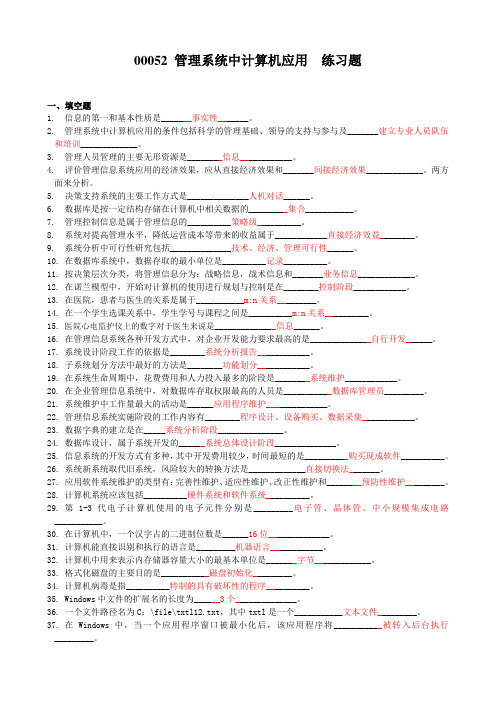
00052 管理系统中计算机应用练习题一、填空题1.信息的第一和基本性质是_______事实性_______。
2.管理系统中计算机应用的条件包括科学的管理基础、领导的支持与参与及_______建立专业人员队伍和培训_____________。
3.管理人员管理的主要无形资源是________信息____________。
4.评价管理信息系统应用的经济效果,应从直接经济效果和_______间接经济效果_____________。
两方面来分析。
5.决策支持系统的主要工作方式是______________人机对话______。
6.数据库是按一定结构存储在计算机中相关数据的_________集合___________。
7.管理控制信息是属于管理信息的__________策略级__________。
8.系统对提高管理水平,降低运营成本等带来的收益属于____________直接经济效益________。
9.系统分析中可行性研究包括______________技术、经济、管理可行性______。
10.在数据库系统中,数据存取的最小单位是__________记录__________。
11.按决策层次分类,将管理信息分为:战略信息,战术信息和_______业务信息_____________。
12.在诺兰模型中,开始对计算机的使用进行规划与控制是在________控制阶段____________。
13.在医院,患者与医生的关系是属于___________m:n关系_________。
14.在一个学生选课关系中,学生学号与课程之间是__________m:n关系__________。
15.医院心电监护仪上的数字对于医生来说是______________信息______。
16.在管理信息系统各种开发方式中,对企业开发能力要求最高的是______________自行开发______。
17.系统设计阶段工作的依据是________系统分析报告____________。
高考英语听力对考生的要求
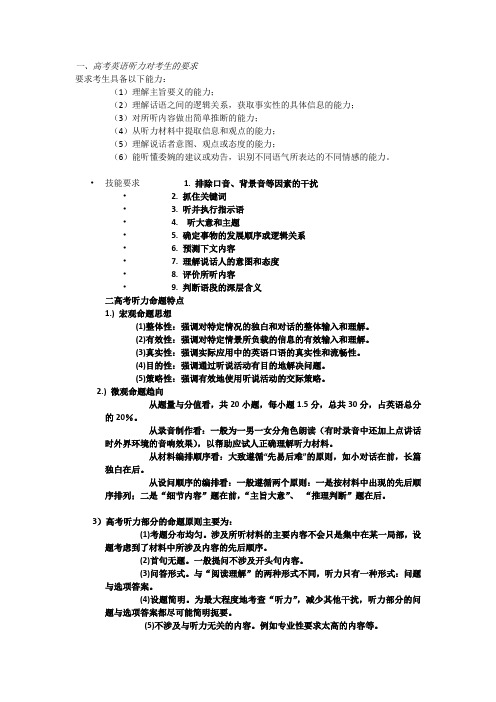
一、高考英语听力对考生的要求要求考生具备以下能力:(1)理解主旨要义的能力;(2)理解话语之间的逻辑关系,获取事实性的具体信息的能力;(3)对所听内容做出简单推断的能力;(4)从听力材料中提取信息和观点的能力;(5)理解说话者意图、观点或态度的能力;(6)能听懂委婉的建议或劝告,识别不同语气所表达的不同情感的能力。
•技能要求 1. 排除口音、背景音等因素的干扰• 2. 抓住关键词• 3. 听并执行指示语• 4. 听大意和主题• 5. 确定事物的发展顺序或逻辑关系• 6. 预测下文内容•7. 理解说话人的意图和态度•8. 评价所听内容•9. 判断语段的深层含义二高考听力命题特点1.) 宏观命题思想(1)整体性:强调对特定情况的独白和对话的整体输入和理解。
(2)有效性:强调对特定情景所负载的信息的有效输入和理解。
(3)真实性:强调实际应用中的英语口语的真实性和流畅性。
(4)目的性:强调通过听说活动有目的地解决问题。
(5)策略性:强调有效地使用听说活动的交际策略。
2.) 微观命题趋向从题量与分值看,共20小题,每小题1.5分,总共30分,占英语总分的20%。
从录音制作看:一般为一男一女分角色朗读(有时录音中还加上点讲话时外界环境的音响效果),以帮助应试人正确理解听力材料。
从材料编排顺序看:大致遵循“先易后难”的原则,如小对话在前,长篇独白在后。
从设问顺序的编排看:一般遵循两个原则:一是按材料中出现的先后顺序排列;二是“细节内容”题在前,“主旨大意”、“推理判断”题在后。
3)高考听力部分的命题原则主要为:(1)考题分布均匀。
涉及所听材料的主要内容不会只是集中在某一局部,设题考虑到了材料中所涉及内容的先后顺序。
(2)首句无题。
一般提问不涉及开头句内容。
(3)问答形式。
与“阅读理解”的两种形式不同,听力只有一种形式:问题与选项答案。
(4)设题简明。
为最大程度地考查“听力”,减少其他干扰,听力部分的问题与选项答案都尽可能简明扼要。
资料收集的主要方法

资料收集的主要方法教育研究中,资料收集的方法是非常多样的,这里简要地介绍常见的几种。
一、文献分析法(一)文献分析法概述1.含义文献是记录有知识的一切载体,即把人类知识用文字、图形、符号、音像等手段记录下来的有价值的典献。
它包括图书、报刊、论文、科学报告、档案等书面印刷品,还包括文物、影片、录音录像带、幻灯片等形态的各种材料。
教育文献是记载教育科学的情报信息和知识的载体。
文献分析法是以现存文献记载为资料来进行研究的一种科学研究方法。
教育中的文献分析法,就是以教育文献为资料,通过教育文献来研究教育现象的一种研究方法。
2.文献分析法的优缺点优点:第一,能用以研究不可能或不容易接近的研究对象。
第二,文献的坦白程度高,真实性强。
第三,文献研究过程简便易行且费用低。
第四,研究结果可靠性大。
缺点:(1)文献本身存在较多的不完善性,这主要表现在:第一,在许多用于教育研究的文献中,作者往往出于特殊目的和意图而夸大或掩盖了部分事实,使文献记载偏差。
第二,选择性存留和破损。
文献的保存常具有选择性,有些人如名人写的文献可以得到维护,而有些人写的文献则常常不易留存,因此现存的文献未必就是活动现象的全部。
再加之文献由于是用纸张书写的,它们常常会有破损。
第三,信息不完全许多尤其是日记、信件等个人文献,不是为研究目的而是为私人目的而写的,包含有一些研究者所不熟悉的关于某些事件的知识,这对于缺乏经验或缺乏有关事件知识的研究者来说,信息是不完全的。
第四,限于言语行为,即文献提供的仅是关于一个回答者的言语行为,而不提供关于回答者非言语行为的直接信息。
(2)文献收集困难。
文献由于具有记载偏差、信息不完全和选择性存留、破损等局限,致使文献的收集存在困难。
并且在许多情况下一些客观事件根本无信息记录,无文献可资利用。
除此之外,许多文献由于种种原因而不能公开,难于收集。
(3)抽样缺乏代表性。
并不是所有人都能留下描述生活、思想、感情的文献资料,有些人的生活、思想、感情容易以文献资料留下来,而有些人的则很难,因此文献所反映的往往只是优势群体的生活、感情和思想观念,而很少反映劣势群体的生活、感情和思想观念,这实际上是一种抽样偏差,缺乏代表性。
外研版高中英语选择性必修一Unit 5 reading 教学设计
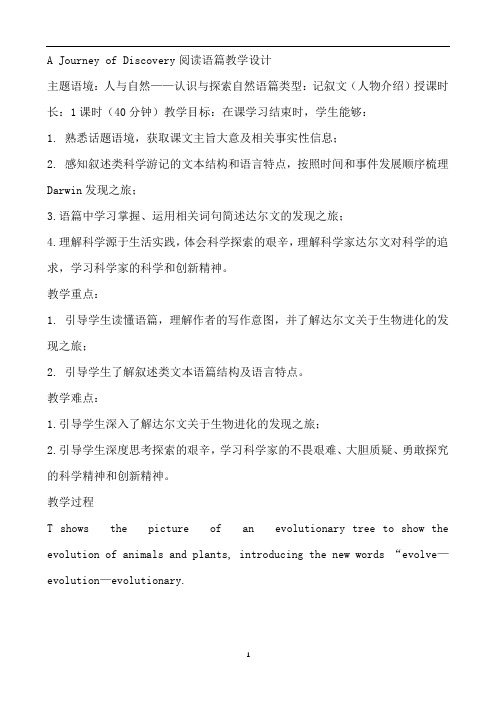
A Journey of Discovery阅读语篇教学设计主题语境:人与自然——认识与探索自然语篇类型:记叙文(人物介绍)授课时长:1课时(40分钟)教学目标:在课学习结束时,学生能够:1. 熟悉话题语境,获取课文主旨大意及相关事实性信息;2. 感知叙述类科学游记的文本结构和语言特点,按照时间和事件发展顺序梳理Darwin发现之旅;3.语篇中学习掌握、运用相关词句简述达尔文的发现之旅;4.理解科学源于生活实践,体会科学探索的艰辛,理解科学家达尔文对科学的追求,学习科学家的科学和创新精神。
教学重点:1. 引导学生读懂语篇,理解作者的写作意图,并了解达尔文关于生物进化的发现之旅;2. 引导学生了解叙述类文本语篇结构及语言特点。
教学难点:1.引导学生深入了解达尔文关于生物进化的发现之旅;2.引导学生深度思考探索的艰辛,学习科学家的不畏艰难、大胆质疑、勇敢探究的科学精神和创新精神。
教学过程T shows the picture of an evolutionary tree to show the evolution of animals and plants, introducing the new words “evolve—evolution—evolutionary.T shows another picture---Darwin with a monkey body. Guess who he is and why? ask the students what they have known about Darwin.T: What have you known about the book?(Arouse students’ curiosity to know more about the book .)T shows the two different forms of “On the origin of species”, to stress the fastest way to find information about a book教学意图:创设情境,利用图片导入主题,引入新单evolve—evolution, ancestor 的学习,激活学生原有背景知识,为下文介绍达尔文的信息进行铺垫;激发学生好奇心。
新闻采访与写作内容要点

新闻采访与写作内容要点一、新闻学几点基础知识新闻概念1.新近发生,发现或即将发生的事实的报道2.新近变动的信息变动产生新闻,关系决定需要新闻特点新鲜、真实新闻本源本源是事实——事实第一性,新闻第二性,先有事实后有新闻新闻价值时间新颖重要显著接近(趣味)新闻要素时间地点事件人物结果原因新闻敏感发现辨别新闻成立与否及其价值大小的能力新闻选择新闻报道过程是个不断选择的过程信息——新闻定义——新闻价值——伦理道德——新闻政策——新闻报道信息——宣传价值——伦理道德——新闻政策——新闻报道新闻类别按新闻内容分:政法经济文教卫生军事体育社会等按新闻发生地方分:国际国内地方按新闻时间性分:突发性延缓性按与读者的关系分:硬新闻软新闻按新闻的体裁分:消息通讯等二、新闻报道的基本要求一、坚持真实性1.何谓真实性?新闻报道反映事实的原貌。
也叫准确性。
2.具体要求:构成新闻的基本要求要真实;新闻所反映的事实的环境和条件、过程和细节、人物语言和动作等必须真实;新闻所引用的各种资料必须确切无误;新闻中所涉人物的思想认识和心理活动等必须属当事人;讲究分寸,留有余地,不要绝对化,注意局部真实性。
3.新闻报道不真实、失实的原因总结:客观原因可能是条件限制,采访受限。
主观上主要原因有:初步接触,不明要求;作风浮夸,粗枝大叶;知识不足,真假难辨;道听途说,不经核实;追求生动,“合理想象”;急功近利,夸大事实;移花接木,牵强附会;沽名钓誉,胡编乱造。
二、坚持思想性1.何谓思想性?新闻报道的思想观点或政治倾向,引导指导思想和行动。
也叫指导性。
2.该如何做?第一,立足传播信息(客观条件)第二,抓住问题(关键)第三,增强可读性(业务手段)三、坚持时间性1.何谓时间性?迅速及时地报道新闻2.如何做?更新观念和作风,改革采编流程,更新报道手段等。
四、坚持“用事实说话”1.什么是“用事实说话”?就是让思想观点通过事实自然流露出来2.为什么要用“用事实说话”?新闻的本源是事实;受众最关心的是事实;事实胜于雄辩。
高中英语Unit2ccessTheImportanceofFailure教案北师大版选择性必修第一册
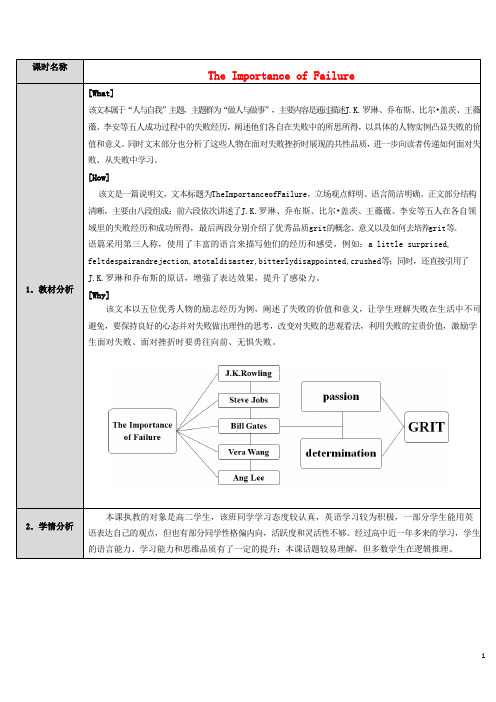
课时名称The Importance of Failure1.教材分析[What]该文本属于“人与自我”主题,主题群为“做人与做事”,主要内容是通过描述J.K.罗琳、乔布斯、比尔•盖茨、王薇薇、李安等五人成功过程中的失败经历,阐述他们各自在失败中的所思所得,以具体的人物实例凸显失败的价值和意义。
同时文末部分也分析了这些人物在面对失败挫折时展现的共性品质,进一步向读者传递如何面对失败、从失败中学习。
[How]该文是一篇说明文,文本标题为TheImportanceofFailure,立场观点鲜明、语言简洁明确。
正文部分结构清晰,主要由八段组成:前六段依次讲述了J.K.罗琳、乔布斯、比尔•盖茨、王薇薇、李安等五人在各自领域里的失败经历和成功所得,最后两段分别介绍了优秀品质grit的概念、意义以及如何去培养grit等。
语篇采用第三人称,使用了丰富的语言来描写他们的经历和感受,例如:a little surprised, feltdespairandrejection,atotaldisaster,bitterlydisappointed,crushed等;同时,还直接引用了J.K.罗琳和乔布斯的原话,增强了表达效果,提升了感染力。
[Why]该文本以五位优秀人物的励志经历为例,阐述了失败的价值和意义,让学生理解失败在生活中不可避免,要保持良好的心态并对失败做出理性的思考,改变对失败的悲观看法,利用失败的宝贵价值,激励学生面对失败、面对挫折时要勇往向前、无惧失败。
2.学情分析本课执教的对象是高二学生,该班同学学习态度较认真,英语学习较为积极,一部分学生能用英语表达自己的观点,但也有部分同学性格偏内向,活跃度和灵活性不够。
经过高中近一年多来的学习,学生的语言能力、学习能力和思维品质有了一定的提升;本课话题较易理解,但多数学生在逻辑推理、6.板书设计7.设计思路Success这一单元属于人与自我主题语境中的做人与做事。
fact面试法
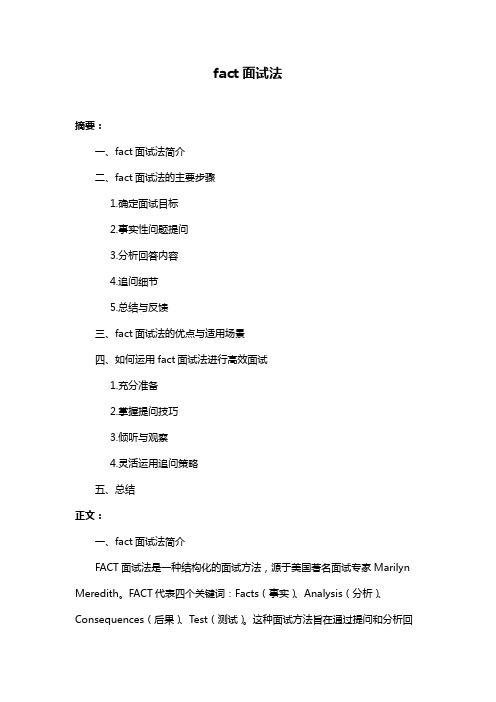
fact面试法摘要:一、fact面试法简介二、fact面试法的主要步骤1.确定面试目标2.事实性问题提问3.分析回答内容4.追问细节5.总结与反馈三、fact面试法的优点与适用场景四、如何运用fact面试法进行高效面试1.充分准备2.掌握提问技巧3.倾听与观察4.灵活运用追问策略五、总结正文:一、fact面试法简介FACT面试法是一种结构化的面试方法,源于美国著名面试专家Marilyn Meredith。
FACT代表四个关键词:Facts(事实)、Analysis(分析)、Consequences(后果)、Test(测试)。
这种面试方法旨在通过提问和分析回答,了解应聘者的能力、经验和潜力,从而做出更准确的招聘决策。
二、fact面试法的主要步骤1.确定面试目标在进行FACT面试前,首先要明确面试的目的和目标,以便更有针对性地提问。
例如,招聘一名销售人员,面试官可以设定目标为了解应聘者的销售技巧、团队合作能力和应变能力。
2.事实性问题提问根据面试目标,提出一系列事实性问题,要求应聘者用具体事例回答。
例如,“请介绍一下你过去完成的一件让你感到骄傲的销售业绩。
”这样的问题有助于了解应聘者的实际工作能力和成果。
3.分析回答内容在听取应聘者的回答后,面试官需要对内容进行分析,关注以下几点:-回答是否具体、真实、客观?-回答中所体现的能力和经验是否符合面试目标?-应聘者在回答过程中是否表现出诚实、自信、沟通能力等素质?4.追问细节在分析回答内容的基础上,面试官可以针对关键点进行追问,深入了解应聘者的实际情况。
例如,在上述销售业绩的问题中,面试官可以追问:“你是如何开展这次销售的?在过程中遇到了哪些困难,如何解决的?”5.总结与反馈面试结束后,面试官需要对收集到的信息进行总结和反馈。
对于符合要求的应聘者,可以给出具体的评价和建议,以便双方在今后的合作中取得更好的成果。
三、fact面试法的优点与适用场景FACT面试法的优点主要包括:-结构性强,有助于面试官系统地了解应聘者-侧重事实,有助于了解应聘者的真实能力与经验-互动性强,有助于面试官观察应聘者的沟通、应变等能力FACT面试法适用于各类岗位的面试,尤其在招聘经验丰富、能力要求较高的职位时,效果更为显著。
事实性知识

事实性知识的教学策略王超事实性知识的教学策略第一事实性知识的学习第二事实性知识的教学策略设计第三事实性知识教学策略设计的案例分析第一事实性知识的学习一.知识与事实性知识的含义•知识是个体通过与其环境相互作用后获得的信息及其组织,储存于个体内,即为个体的知识;通过书籍或其他媒介存储与个体外,即为人类的知识。
•事实性知识的含义是事实性知识又叫事实,是一种重要的知识类型,安德森等人认为是指学习者通晓一门学科或解决其中的问题所必须指导的基本要素。
伊根等人认为事实性知识是一种单独出现的、存在于过去和当前多的、不具有预测价值并且只能通过观察过程而获得的内容类型。
从这两个定义中,我们可以发现事实性知识有以下这些特点:一是事实性知识的点滴性或孤立性。
比如我们在回答“皖”是我国哪个省份的简称的时候,我们会回答是安徽省的简称,而不需要知道安徽为什么简称“皖”、安徽的地理位置、民俗风情、土特产等方面的信息,因而这条属于点滴性的事实性知识。
二是这种知识的抽象概括水平较低。
如学生能陈述“1842年鸦片战争爆发”,即证明了他掌握了一条历史方面的事实性知识。
三是事实性知识的基础性。
如儿童习得了自家养的宠物狗及邻居家养的宠物狗的一些事实,才有可能形成“狗”的概念。
二.事实性知识的作用.事实性知识对我们日常生活十分重要。
例如,银行几点开门关门,你才能很好地办理相关金融业务。
.事实性知识是学生进一步学习的基础。
例如,你只有学会互联网的操作,才可以通过互联网学习其他知识。
.事实性知识的掌握程度还能体现一个人的文化素养。
例如,有媒体报道某些参加歌手大赛的选手在答到西游记的作者是:1.古龙;2.司马迁;3.吴承恩。
答曰:古龙。
由此可以反映出这些歌手的文化素质仍需提高。
三.事实性知识的学习(一)事实性知识学习的含义事实性知识的学习分为学习的程度和学习的过程。
从学习程度方面看,事实性学习又细分为三个:记忆、理解和运用。
从学习过程方面看,分为六大阶段:1.注意和预期。
广播电视新闻采访
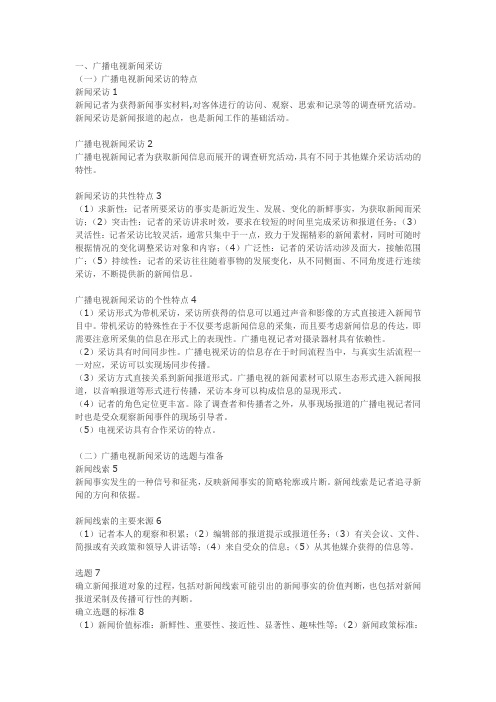
一、广播电视新闻采访(一)广播电视新闻采访的特点新闻采访1新闻记者为获得新闻事实材料,对客体进行的访问、观察、思索和记录等的调查研究活动。
新闻采访是新闻报道的起点,也是新闻工作的基础活动。
广播电视新闻采访2广播电视新闻记者为获取新闻信息而展开的调查研究活动,具有不同于其他媒介采访活动的特性。
新闻采访的共性特点3(1)求新性:记者所要采访的事实是新近发生、发展、变化的新鲜事实,为获取新闻而采访;(2)突击性:记者的采访讲求时效,要求在较短的时间里完成采访和报道任务;(3)灵活性:记者采访比较灵活,通常只集中于一点,致力于发掘精彩的新闻素材,同时可随时根据情况的变化调整采访对象和内容;(4)广泛性:记者的采访活动涉及面大,接触范围广;(5)持续性:记者的采访往往随着事物的发展变化,从不同侧面、不同角度进行连续采访,不断提供新的新闻信息。
广播电视新闻采访的个性特点4(1)采访形式为带机采访,采访所获得的信息可以通过声音和影像的方式直接进入新闻节目中。
带机采访的特殊性在于不仅要考虑新闻信息的采集,而且要考虑新闻信息的传达,即需要注意所采集的信息在形式上的表现性。
广播电视记者对摄录器材具有依赖性。
(2)采访具有时间同步性。
广播电视采访的信息存在于时间流程当中,与真实生活流程一一对应,采访可以实现场同步传播。
(3)采访方式直接关系到新闻报道形式。
广播电视的新闻素材可以原生态形式进入新闻报道,以音响报道等形式进行传播,采访本身可以构成信息的显现形式。
(4)记者的角色定位更丰富。
除了调查者和传播者之外,从事现场报道的广播电视记者同时也是受众观察新闻事件的现场引导者。
(5)电视采访具有合作采访的特点。
(二)广播电视新闻采访的选题与准备新闻线索5新闻事实发生的一种信号和征兆,反映新闻事实的简略轮廓或片断。
新闻线索是记者追寻新闻的方向和依据。
新闻线索的主要来源6(1)记者本人的观察和积累;(2)编辑部的报道提示或报道任务;(3)有关会议、文件、简报或有关政策和领导人讲话等;(4)来自受众的信息;(5)从其他媒介获得的信息等。
- 1、下载文档前请自行甄别文档内容的完整性,平台不提供额外的编辑、内容补充、找答案等附加服务。
- 2、"仅部分预览"的文档,不可在线预览部分如存在完整性等问题,可反馈申请退款(可完整预览的文档不适用该条件!)。
- 3、如文档侵犯您的权益,请联系客服反馈,我们会尽快为您处理(人工客服工作时间:9:00-18:30)。
数情况下,事实细节题会在题干设置、选项设置上增加干扰,提高难度。
详见2.2。
答题关键:抓住题干中的关键词:the double doors;主动留意、用心获取与之相关的答题信息。
2.2 需要稍费周折的获取事实性的具体信息的题目总结2009-2012年PETS2听力真题可以发现:获取事实性的具体信息的题目的答案一般不会直接获取。
我们从下面的例子中进行体会。
例2.2.1(2011-9)12. Who will probably get surprised at the party? (C)A. Maggie.B. The man.C. Jackie.原文:W: Did you hear Jackie’s going to work in another department? We need to have a reallygood party so that we can send her off really well. So, what shall we do?M: Well, why don’t we have a surprise party, Maggie?题目分析:这是一道在设问关键词上做文章的获取事实性的具体信息的题目。
答题关键:这道题设计的巧妙之处在于:设问关键词surprise与干扰项A紧密出现;而正确选项出现在第一句,如果听的时候不仔细或是记忆出现偏差就容易误选。
例2.2.2(2011-9)14. What can an international student expect in a home-stay family? (C)A. A bathroom of their own.B. No choice of meals.C. A shared bedroom.原文:All families provide a single or shared room and a choice of meals. In most cases, students will be expected to share the bathroom.题目分析:这是一道在选项设置上做文章的获取事实性的具体信息的题目。
答题关键:三选项中的关键词:bathroom, choice of meals和shared bedroom在材料中密集出现,给考生做出判断起了很强的干扰作用。
例2.2.3(2011-9)17. What’s the purpose of the program? (C)A. To plan a nice weekend.B. To prepare for New Year’s Day.C. To celebrate the start of a vacation.原文:To celebrate the end of the school year, we’ve prepared for the children all kinds of gifts…题目分析:这是一道在正确选项上做文章的获取事实性的具体信息的题目。
答题关键:正确选项中的the start of a vacation就是the end of the school year的转述。
例2.2.4(2011-3)11. Where does the woman work? (A)A. In a hospital.B. In a lab.C. On a farm.原文:W:Well, AHT stands for animal health technician. I graduated from California’s first AHT class at Peals College. Some of us may work in the countryside taking care of cattle horses or sheep. Some may work in research labs. But most of us work in pet hospitals.M:I know that you work in a pet hospital. What do you do there?题目分析:这是一道先抑后扬的获取事实性的具体信息的题目。
答题关键:考生可能无法从W的相对专业和繁琐的描述中找到头绪,但是当听到M说的…you work in a pet hospital时便可茅塞顿开。
这正是PETS2材料组织的特点之一。
例2.2.5(2010-3)2. What is the speed now? (B)A. 55 miles per hour.B. 70 miles per hour.C. 105 miles per hour. 原文:M: Do you think I am going too fast?W: Of course, the speed limit here is 55 miles per hour, and you are going 15 miles over it.题目分析:这是一道数字计算的获取事实性的具体信息的题目。
答题关键:over 表示“超过”,所以现在的时速是:55+15=70mph 。
例2.2.6(2009-9)9. What does the man plan to do? (C)A. Visit Jenny.B. Go to Scotland .C. Meet friends.原文:Yes, you see, some friends of mine from Scotland are coming down. I haven’t seen them for ages. And I managed to get some tickets for a concert and I promised to take them out to dinner after work. I can’t get out of it , unfortunately. I wish I could.题目分析:这个人拒绝了朋友的要求,他计划去做什么呢?答题关键:这个人说了一大堆的话,但概括起来就是去会见朋友。
百朗专项:.....英语听力模拟试题(.........四.)关于...细节干扰问题......的训练...附:2012.3和2011.9二级考试获取事实性的具体信息类题目汇编一、直接获取事实性的具体信息的题目(2012-3)Text 6W: May I help you, sir?M: Yes, please. I want to buy a personal gift for my brother. He is taking a trip to South America. W: Is he going by ship or plane?M: He’s flying. My gift will have to be something light in weight. What can you suggest?W: What about this tie? It’s made of pure silk.M: My sister already gave him o ne. I’d like something unusual. Let me look around… oh, thatclock looks nice, but …W: Hey, here’s a gift for the man who has everything.M: Oh, a folding toothbrush! That’s a wonderful idea. I’ll take it.7. What will the man probably buy for his brother? (A)A. A toothbrush.B. A silk tie.C. A clock.W: Have you heard that the boss of the law office where Rick works wants him to fly to Brazil and do a month’s work there?M: Yes, that’s nice. He will love it because everything will be paid for, such as air travel, meals, hotel and this is his first time to get out of the States.W: Indeed, you won’t believe how much he is looking forward to it, and how much his little sister admires him. He’s going to enjoy lying on the beaches when work is done, and he promised to buy her sister gifts.M: Who else is going besides him?W: He’s going alone.M: When will he be leaving?W: He was told about it three days ago, and I think he will leave in a week.8. Where is Rick working now? (C)10. When will Rick leave? (B)Hello, I’m Calvin Robi nson. And this is London Life. In the program today let me ask you a question first: what do you think would be the hardest job in Britain? A police officer? Perhaps a deep-sea fisherman? Well, no, according to a recent research, being a London taxi driver takes that prize. It’s really a hard job, really difficult. One reason is the traffic. It’s getting worse and worse in London. For most of us if we have to sit in a traffic jam for a few minutes, we get anxious. But imagine if you had to do that all day, every day as your job. What’s more, passengers get into the taxi and want to get from A to B as quickly as possible. They’re in a hurry and that makes things worse for the drivers.To prepare for the test, would-be drivers have to remember ways and places of interest around central London. This is an area which has about 25000 streets and they need to be able to take passengers from A to B without having to look at a map and without having to ask for directions. It usually takes nearly 3 years to pass the test, so it is also found in the research that parts of the brains of the taxi drivers are actually larger than those in the general population. It seems as if learning all the streets and ways makes a part of the brain grow. Well, anyway, this is a most tiring job. Next time you are stuck in a traffic jam and feel mad, spare a thought for the taxi drivers who have to spend most of their working life in them.19. What makes driving a taxi a hard job in London? (A)A. Bad traffic.B. Confused street names.Text 10Good morning, children and parents. Welcome to the Neighborhood Children’s Club. To celebrate the end of the school year, we’ve prepared for the children all kinds of gifts, such as sweets, chocolates, bookmarks and pencils. To increase the fun, we’ve hidden them for the children to find around this building.Here is the information you need to know. First of all, we need all children to put your names down at the desk at that corner, because it will be divided into age groups. You haven’t done it yet, please do it now. Then, if you’re ready, preschool children will be going out of this front door. And we will encourage their parents to go with them. Outside this door, you will see flags as the marking for your area. There will be some helpers to direct you. If you are in the first to third grade, you are going right outside that back door to search in the yard. The parents of this group are welcome to go with the children. But maybe your children don’t need you. Finally, the fourth graders and I, the three of you, please follow me down the hall through the double doors and choose the other side of the building where you’ll be going to look for your gifts. There are over 200 gifts around this building, and it should be plenty for everyone.20. Who will go out of the building through the double doors? (C)A. The preschool children.B. The third grade children.(2012-3)Text 3M: It drives me mad when people use their cell phones at the wheel.W: Hmm. What happened?M: I nearly had an accident because the woman was talking on her cell phone while driving and didn’t see the traffic lights turn red. She nearly killed me.3. What is the man angry about? (A)A. Telephoning while driving.B. Some women drivers.W: May I help you, sir?M: Yes, please. I want to buy a personal gift for my brother. He is taking a trip to South America.W: Is he going by ship or plane?M: He’s flying. My gift will have to be something light in weight. What can you suggest?W: What about this tie? It’s made of pure silk.M: My sister already gave him one. I’d like something unusual. Let me look around…oh, that clock looks nice, but …W: Hey, here’s a gift for the man who has everything.M: Oh, a folding toothbrush. That’s a wonderful idea. I’ll take it.6. How will the man’s brother go to South America? (B)M: Oh, who is the beautiful old woman in front of the house?W: That’s my grandmother.M: Oh, then that must be your house in the background. Where is it?W: No, that’s my grandmother’s house. She lives in Kentucky. We live in Boston, about two and a half hours away by plane.M: Then does she live with your uncle or aunt?W: No, since her husband died, she has lived alone.M: Alone? But she is so old. Who takes care of her?W: She takes care of herself, though she is 81 this year and is beginning to slow down a little. She has a cleaning lady who comes for a few hours a week to clean house and help with the shopping.M: But isn’t she lonely without family?W: Of course not. She has lived in the same neighborhood since she was first married, so she knows all the neighbors, young and old, and she has lots of friends.M: Why doesn’t she live with you? Don’t you miss her?W: Well, actually we talk to her on the phone every week and visit her at least once a year. But we’re busy with our lives, and so is she. We love to have her visit, but we all know that if she lived with us we might not get along as well.11. What do we know about the grandmother? (A)A. She lives by herself.B. She’s as healthy as before.A. Since her husband died.B. Since she was married.13. What does the grandmother enjoy about her present life? (C)A. Being busy with housework.B. Being with relatives.W: And I realized we were completely lost, but at least we got there in the end.M: Funny you should say that because, er, a similar thing happened to me one time when I was abroad. We were actually doing a concert in this bar in Germany.W: Really?M: I was actually about to appear on the stage, you know, with the band. And I just thought, “I’ll just go out for a little walk and get some fresh air.”Because I had half an hour before we had to go on.W: Uh-huh.M: And I went outside, you know, had a look around, walked around for a bit… and then I decided to go back and, uh, I couldn’t find it! It was about two minutes before we were supposed to start.W: No, you’re joking!M: Yeah! I thought, “Ah! What am I gonna do?”W: Could you ask for directions?M: Well, I tried. I asked this old woman but she didn’t speak English and I don’t speak German…W: Didn’t you? Oh, right.M: And then, I realized that I couldn’t remember the name of the bar, or the street it was on or anything. So, you know, I was in the middle of a town I didn’t know, not knowing the language…. and luckily, I saw someone wearing one of our T-shirts. He was obviously going to the concert, so I sort of followed him back to the bar.W: Well, that was lucky! Thank Goodness!M: And when I got there, the guys were like, “Where have you been? We thought you’d run out on us!” Anyway, we managed.14. What was the woman talking about at the beginning of the conversation? (B)A. Her story of completing a task.B. Her experience of being lost.15. What did the man do in the bar in Germany? (C)A. Met his friends.B. Attended a lecture.A. By following a man.B. By looking at a map.A. He cannot stand the noise in the bar.B. He doesn’t like to wear T-shirts.Hello, I’m Calvin Robinson. A nd this is London Life. In the program today let me ask you a question first: what do you think would be the hardest job in Britain? A police officer? Perhaps a deep-sea fisherman? Well, no, according to a recent research, being a London taxi driver takes that prize. It’s really a hard job, really difficult. One reason is the traffic. It’s getting worse and worse in London. For most of us if we have to sit in a traffic jam for a few minutes, we get anxious. But imagine if you had to do that all day, every d ay as your job. What’s more, passengers get into the taxi and want to get from A to B as quickly as possible. They’re in a hurry and that makes things worse for the drivers.To prepare for the test, would-be drivers have to remember ways and places of interest around central London. This is an area which has about 25000 streets and they need to be able to take passengers from A to B without having to look at a map and without having to ask for directions. It usually takes nearly 3 years to pass the test, so it is also found in the research that parts of the brains of the taxi drivers are actually larger than those in the general population. It seems as if learning all the streets and ways makes a part of the brain grow. Well, anyway, this is a most tiring job. Next time you are stuck in a traffic jam and feel mad, spare a thought for the taxi drivers who have to spend most of their working life in them.20. What will the speaker probably do if he’s stuck on the road? (B)A. Have a map ready.B. Be understanding.(2011-9)Text 4M: I plan to give Mum a surprise by making a coffee table for her birthday. I’m t rying to do it without making a noise.W: That’s going to be difficult when you start working.4. What’s going to be difficult for the man? (B)A. Making nice coffee.B. Working at home quietly.M: Have you seen Mr. Li?W: No, I haven’t. Is he looking for me?M: Yes, he is. He wants to talk to you.W: To me? About what?M: There’s an opening in the sales department. He wants to talk to you about it.W: Oh, that’s great! What kind of job is it?M: He hasn’t told me exactly. But it will be a better job than this.W: Thank you for your help.M: Don’t thank me yet! He hasn’t talked to you and he hasn’t chosen you for the job yet.W: I know.7. What does Mr. Li want to talk to the woman about? (A)A. A job offer.B. A big sale.Text 7W: Where are you from?M: Australia, from Sydney. I was in that university, you know, I just finished and er …I thought I’d go off around the world for a bit.W: What a long way to come! You have a long holiday, I suppose.M: Well, I’ve finished my studies, you know, and I have found a job in a shipping firm. But I have three months’ holiday before I start to work. So I thought I’d just take some time to go around the world. If I need money, I just work where I am, you know, mainly teach English to young children. I used to work in a school and I like children. But at the moment, I am just having a holiday, wonderful here. I first arrived in Europe a couple of weeks ago. I went to France, and er, I came around…er…through Britain and I went right across the Japan, and then Korea. Now, here I am, in China.W: Wonderful! You must tell us all about your travels, because we are all very interested. I will be working in a foreign trading firm soon. That’ll help me learn something about other countries. M: Well, there is not much to tell really. But I can show you photos and postcards.W: But…um…listen. Maybe, if you’d like, you can come to my home and have supper with us and, er…M: Oh. That would be lovely.W: Well, you can tell us all about your stories and we can make you a very nice meal. How aboutthat?M: That would be wonderful. A wonderful Chinese meal! A real Chinese meal! How lovely that’d be! Wonderful.W: Good!8. What is the man doing now? (B)A. Trying to find a job.B. Traveling round the world.A. In an Australian school.B. In a shipping company.W: Did you hear Jackie is going to work in another department? We need to have a really good party so that we can send her off really well. So what shall we do?M: Well, why don’t we have a surprise party, Ma ggie?W: That’s a good idea. We could go to the Holiday Inn hotel.M: That’s too expensive. Maybe we could ask Carrie to make a cake.W: Yeah, let’s do that. Perhaps we could just give the party in the office and put up some balloons.M: That’s great. I th ink we should also buy a really big card, a huge card and we should get everybody to sign it.W: Shall we have some music?M: I was thinking exactly that myself. But...11.What do the speakers decide to do? (A)A. Ask Carrie for help.B. Buy a huge cake.A. Maggie.B. The man.Text 9M: How are your home-stay families chosen?W: We have special requirements that the families must meet before they are invited to have our international students. We require that the families live within a reasonable distance of the school, have enough living space for the student and live in a clean, safe and comfortable area.We also work with the families who enjoy having international students. We try to match each student with a family as best we can.M: If I stay with a home-stay family, what should I expect?W: The family will treat you as a guest and you will be expected to obey house rules. All families provide a single or shared room and a choice of meals. In most cases, students will be expected to share the bathroom. Experience has shown us that living with a family is the most interesting and effective way to learn the language. Remember, your home-stay family will have different customs and habits from what perhaps you are used to. Meals would be prepared by the family. All home-stay families are within 30 minutes’ traveling time of the school. The smaller the city, the less time it takes to reach the school.13. What kind of families can be possibly chosen as home-stay families? (B)A. Good at cooking.B. Close to the school.14. What can an international student expect in a home-stay family? (C)A. A bathroom of their ownB. No choice of meals.15. What is the main advantage of studying with a home-stay family? (A)A. Learning the language better.B. Having more freedom.A. Cook for the family.B. Keep his or her habits.Good morning, children and pare nts. Welcome to the Neighborhood Children’s Club. To celebrate the end of the school year, we’ve prepared for the children all kinds of gifts, such as sweets, chocolates, bookmarks and pencils. To increase the fun, we’ve hidden them for the children to find around this building.Here is the information you need to know. First of all, we need all children to put your names down at the desk at that corner, because it will be divided into age groups. You haven’t done it yet, please do it now. Then, if you’re ready, preschool children will be going out of this front door. And we will encourage their parents to go with them. Outside this door, you will see flags as the marking for your area. There will be some helpers to direct you. If you are in the first to third grade, you are going right outside that back door to search in the yard. The parents of this group are welcome to go with the children. But maybe your children don’t need you. Finally, the fourth graders and I, the three of you, please follow me down the hall through the double doors and choose the other side of the building where you’ll be going to look for your gifts. There are over 200 gifts around this building and it should be plenty for everyone.17. What’s the purpose of the program? (C)A. To plan a nice weekend.B. To prepare for New Year’s Day.A. Look for the hidden gifts.B. Hide around the building.A. Wait at a corner.B. Give their names at a desk.。
